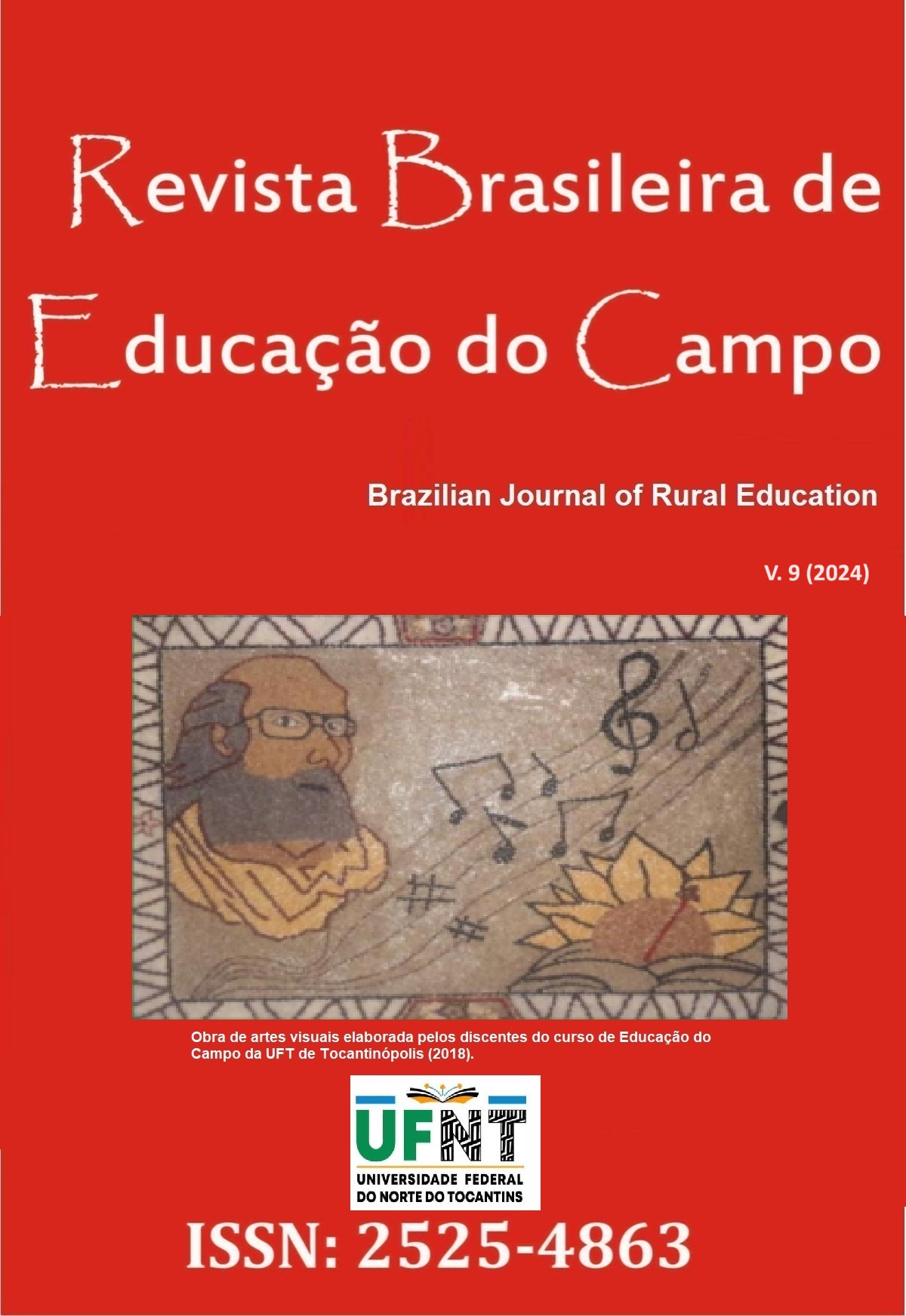Family Agricultural School: Reflections based on the social representations of alumni and parents
DOI:
https://doi.org/10.70860/ufnt.rbec.e17822Abstract
ABSTRACT. This article originated from a case study conducted on a Family Agricultural School (EFA) located in northern Minas Gerais, with the aim of examining how its teaching model can contribute to the development of an educational perspective focused on rural subjects. The social representations of the graduates and their parents regarding the EFA were identified and discussed. This was a qualitative-exploratory study that used narrative interviews as a data production strategy. Sixteen interviews were conducted with graduates and parents, and these interviews were processed using the Iramuteq software for lexical analysis. The result of this analysis identified five classes of words outlining semantic fields that enabled the construction of the analysis categories. The school-family-community trinomial presented itself as a central element of representations about EFA, highlighting two dimensions, technical training and pedagogical principles. It is evident that dialogue between school-family-community is essential in the construction of knowledge in rural schools, as well as in transforming the reality of rural communities. This dialogue has positive impacts on the identity bond with the countryside, creating new possibilities for relationships with the territory. It appears that EFA's pedagogical proposal aligns with the Rural Education Movement and its public policies.
Downloads
Literaturhinweise
Abric, J. C. (2000). A abordagem estrutural das representações sociais. In Moreira, A., Oliveira, D. C. (Orgs.). Estudos interdisciplinares de representação social (pp. 27-37). 2.ed. AB.
Alves-Mazzotti, A. J. (2008). Representações sociais: aspectos teóricos e aplicações à Educação. Múltiplas Leituras, 1(1), 18-43. https://www.researchgate.net/publication/276239360_Representacoes_Sociais_Aspectos_Teoricos_e_Aplicacoes_a_Educacao DOI: https://doi.org/10.15603/1982-8993/ml.v1n1p18-43
Alves, L. C. F. (2016). A (des)construção do conhecimento na Educação do Campo: diálogos entre os saberes no ensino de Matemática (Dissertação de Mestrado). Universidade Federal de Minas Gerais, Belo Horizonte. https://repositorio.ufmg.br/handle/1843/BUBD-ANKPRB
Begnami, J. B. (2003). Formação pedagógica de monitores das Escolas Famílias Agrícolas e Alternâncias: um estudo intensivo dos processos formativos de cinco monitores (Dissertação de Mestrado). Universidade Nova de Lisboa, Lisboa. https://run.unl.pt/handle/10362/391
Begnami, J. B. (2019). Formação por alternância na licenciatura em Educação do Campo: possibilidades e limites do diálogo com a pedagogia da alternância (Tese de Doutorado). Universidade Federal de Minas Gerais, Belo Horizonte. https://repositorio.ufmg.br/handle/1843/32692 DOI: https://doi.org/10.47930/1980-685X.2020.0601
Bertaux, D. (2010). Narrativas de vidas: a pesquisa e seus métodos. Paulus, EdUFRN.
Caldart, R. S. (2008). Sobre educação do campo. In Santos, C. A. (Org.). Por uma educação do campo: campo-políticas públicas-educação. Incra/MDA.
Conferência Nacional da Pedagogia da Alternância do Brasil – Conpab. (2019). 50 anos da Pedagogia da Alternância no Brasil. In Anais da I Conferência Nacional da Pedagogia da Alternância do Brasil (CONPAB) & I Colóquio Internacional Interdisciplinar da Pedagogia da Alternância & IV Seminário Internacional da Pedagogia da Alternância no Brasil. União Nacional das Escolas Famílias Agrícolas do Brasil (Unefab).
Fernandes, B. M., & Molina, M. C. (2004). O campo da Educação do Campo In Molina, M. C. & De Jesus, S. M. S. A. (Orgs.) Contribuições para a construção de um projeto de Educação do Campo (pp. 32-53). Articulação Nacional Por uma Educação do Campo.
Gimonet, J. C. (1999). Nascimento e desenvolvimento de um movimento educativo: as casas familiares rurais de educação e orientação. In Anais Seminário Internacional da Pedagogia da Alternância: alternância e desenvolvimento. Unefab.
Jodelet, D. (2001). Representações sociais: um domínio em expansão. In Jodelet, D. (Ed.). As representações sociais (pp. 17-44). Uerj.
Jovchelovitch, S. (2004). Psicologia social, saber, comunidade e cultura. Psicologia & Sociedade, 16(2), 20-31. https://www.scielo.br/j/psoc/a/TbQqQMLs9D5jQ5CRGzZQNSK/abstract/?lang=pt DOI: https://doi.org/10.1590/S0102-71822004000200004
Marques, L. O. C. (2019). Ensino de Língua Estrangeira, Educação do Campo e Letramentos Críticos: tecendo diálogos (Tese de Doutorado). Universidade de São Paulo, São Paulo. DOI: https://doi.org/10.11606/T.8.2020.tde-27022020-143234 DOI: https://doi.org/10.11606/T.8.2020.tde-27022020-143234
Minayo, M. C. S. (2012). Análise qualitativa: teoria, passos e fidedignidade. Ciência & Saúde Coletiva, 17(3), 621-626. https://www.scielo.br/j/csc/a/39YW8sMQhNzG5NmpGBtNMFf/ DOI: https://doi.org/10.1590/S1413-81232012000300007
Moscovici, S. (2012). A psicanálise, sua imagem e seu público. Vozes.
Nogueira, E. M. L., & Ribeiro, D. S. (2022). Escola Família Agrícola: propostas de Educação Transformadora. Revista Brasileira de Educação do Campo, 7, 1-22. https://periodicos.ufnt.edu.br/index.php/campo/article/view/13730/20717 DOI: https://doi.org/10.20873/uft.rbec.e13730
Nosella, P. (2012). Educação do Campo: origens da Pedagogia da Alternância no Brasil. Edufes.
Ribeiro, L. P., & Antunes-Rocha, M. I. (2021). Identidade e representações sociais: evidências e correlações a partir de pesquisas da área da Educação. Revista Educação e Cultura Contemporânea, 18(52), 402-435. https://doi:10.5935/2238-1279.20210019 DOI: https://doi.org/10.5935/2238-1279.20210019
Saviani, D. (2021, de 27 maio). Educação e democracia [YouTube]. Recuperado de https://www.youtube.com/watch?v=ZSnRdrm2NUo
Silva, L. L. (2017). Dois tempos, vários lugares: trabalho e emancipação em alternância (Tese de Doutorado). Universidade Federal de Minas Gerais, Belo Horizonte. https://repositorio.ufmg.br/handle/1843/BUBD-AW9NGH
Silva, N. M. de A., Dautro, G. M., Dias, M. A. da S., Oliveira, Érica C. S. de, & Luna, K. P. de O. (2021). Representações sociais e ensino de ciências / Social representations and science teaching. Brazilian Journal of Development, 7(1), 3042-3053. https://doi.org/10.34117/bjdv7n1-207 DOI: https://doi.org/10.34117/bjdv7n1-207
Downloads
Veröffentlicht
Zitationsvorschlag
Ausgabe
Rubrik
Lizenz
Copyright (c) 2024 Eurivaldo Nunes Rodrigues, Paulo Afrânio Sant’Anna

Dieses Werk steht unter der Lizenz Creative Commons Namensnennung 4.0 International.
Creative Commons Attribution License
Creative Commons Attribution License
Proposal for Copyright Notice Creative Commons
1. Policy Proposal to Open Access Journals
Authors who publish with this journal agree to the following terms:
A. Authors retain copyright and grant the journal right of first publication with the work simultaneously licensed under the Creative Commons Attribution License that allows sharing the work with recognition of its initial publication in this journal.
B. Authors are able to take on additional contracts separately, non-exclusive distribution of the version of the paper published in this journal (ex .: publish in institutional repository or as a book), with an acknowledgment of its initial publication in this journal.
C. Authors are permitted and encouraged to post their work online (eg .: in institutional repositories or on their website) at any point before or during the editorial process, as it can lead to productive exchanges, as well as increase the impact and the citation of published work (See the Effect of Open Access).














